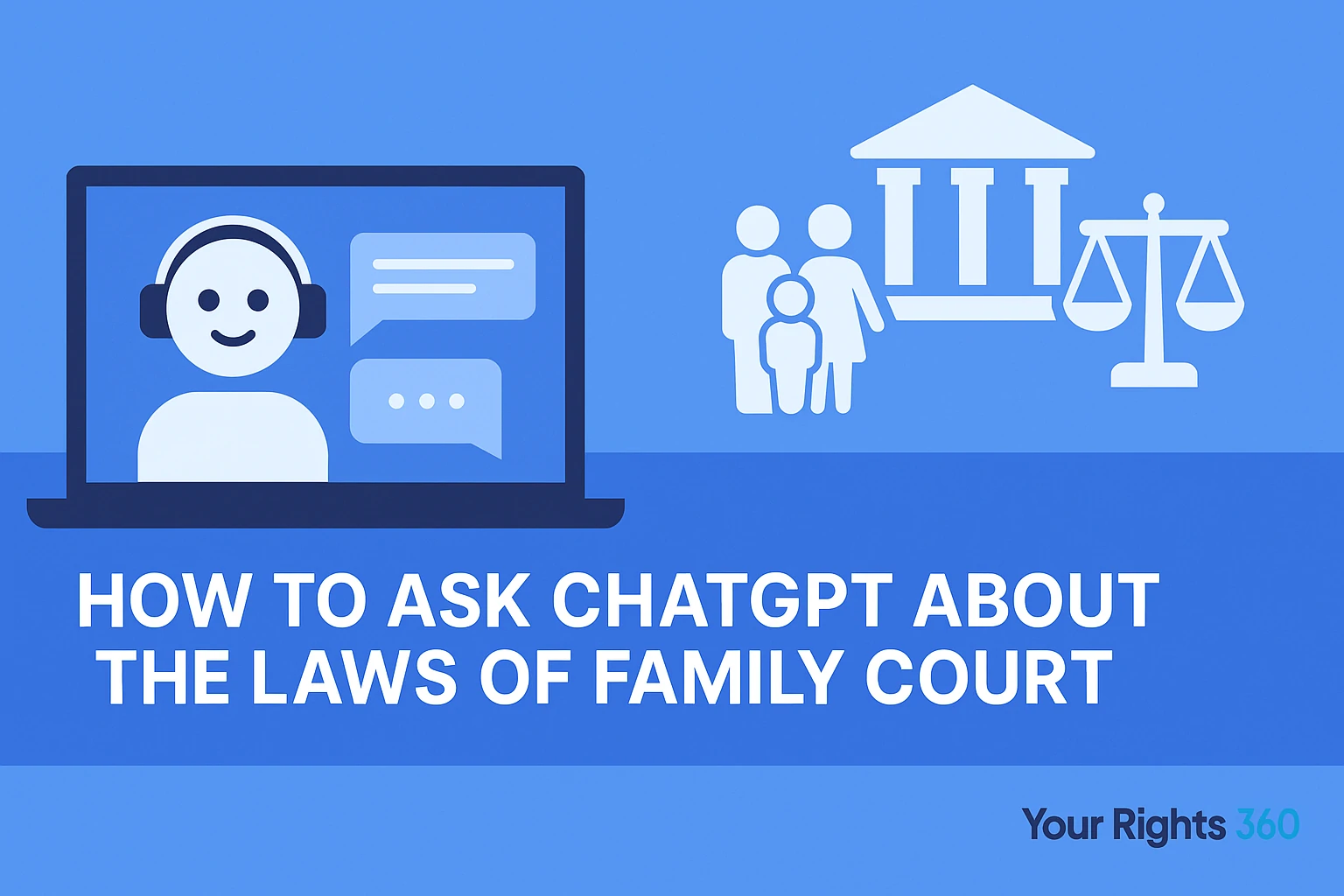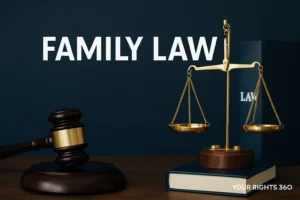Many people face family court at some point in life. Divorce, child custody, and support issues bring confusion and stress. Most do not know where to turn for clear answers. The legal world feels full of rules that make no sense at first glance. People want a safe place to ask questions and get direct, simple guidance. ChatGPT gives a new path for those seeking fast answers about family court laws. This guide shows you how to use ChatGPT the right way, so you walk away with the facts you need.
Family court law touches every part of life. The stakes feel high because children, homes, and futures sit on the line. Most do not plan for these problems. Trouble often comes with little warning. When court papers arrive, fear and confusion follow. Old ways meant running to a lawyer or reading hard-to-follow books. Technology now gives everyone a chance to learn the basics quickly, with help from AI tools like ChatGPT.
ChatGPT changes how people get legal information. You can type any question in plain English and receive a quick, friendly answer. This service does not judge, charge fees, or make you wait in line. It works at any hour and fits your own pace. Many people start with ChatGPT to break down legal topics, understand their choices, and avoid mistakes. You can gain control over your case just by learning how to ask the right questions.
This article explains each step in using ChatGPT for family court questions. You will learn what to expect, how to get the best results, and what limits exist. Clear advice gives you confidence. Good answers help you avoid confusion and take the next step. Let us explore how you can make the most of ChatGPT for family law issues.
What Is ChatGPT and How Can It Help?
ChatGPT is a digital tool built on advanced technology from OpenAI. It reads your questions and gives answers in simple English. Many people use ChatGPT for basic legal questions, including those about family court. The service never takes the place of a real lawyer. Instead, it helps you understand the law in broad strokes. ChatGPT offers general guidance and explains tricky words, common rules, or steps to start a case.
People turn to ChatGPT because it gives quick answers. You do not need legal training or fancy language. You type your question in plain English. ChatGPT reads it and gives you a simple reply. Many find this tool helpful, especially if they feel unsure about the law or want to solve small legal questions before reaching out to a lawyer.
Family court deals with problems like divorce, custody, support, or protection orders. ChatGPT covers all these topics. If you have never gone to court, this tool can show you what to expect. If you want to know the meaning of “custody,” ChatGPT can explain it in words that make sense. If you wonder about your first court date, you can ask and get a clear outline of what happens. You do not need to pay large fees or read confusing legal books to get these answers.
Why More People Turn to ChatGPT for Family Court Questions
Most people want quick answers before they visit a lawyer. Many feel embarrassed or stressed about personal problems. ChatGPT gives you a private space to ask anything. The tool helps you learn about family court in your own words and on your own time. You do not need to fear harsh judgment or hidden fees.
Many people trust ChatGPT because it does not ask for private facts. You never need to share your full name or home address. You do not enter personal details about your family. This helps you protect your privacy each time you use the tool. You choose what to share and what to keep secret. The service gives you peace of mind and keeps your information safe. You stay in control from start to finish.
Another reason is the simple language. ChatGPT does not use hard legal terms unless you ask. Every answer reads like a normal conversation. You get facts that make sense and tips you can use right away. The technology works day and night, so you never need to wait for office hours.
Setting Realistic Expectations Before You Ask
ChatGPT can help you with general family court questions. It does not replace a real attorney. This tool works best for learning about legal concepts, common court steps, or finding out where to start. It cannot look at your paperwork, call witnesses, or give you advice for your exact case. Courts and judges do not accept answers from AI in place of a real lawyer.
Use ChatGPT as your first stop. It points you in the right direction and explains confusing topics. Later, a real attorney can take your specific facts and give advice that fits your life. If your case involves deadlines, risk to a child, or money, always check with a legal expert in your state.
How to Ask ChatGPT the Right Way
Strong answers come from simple questions. Keep your request short and focus on one point. You do not need legal terms. Use plain words you know well. Ask, “How do I get custody of my child?” instead of a long or detailed question. If your question is about local laws, add your state or city. This helps ChatGPT give you an answer that matches your situation.
Adding a small detail about your situation makes the answer more useful. You might say, “I have two children and I live in Texas. What does joint custody mean?” or “My ex moved to another state. What can I do?” Always keep private facts out of the chat. Do not share names, addresses, or sensitive stories. Focus on the legal problem, not your full background.
ChatGPT works well when you ask one question at a time. If you have several questions, ask each one on its own. This keeps your answers clear and easy to follow. You can ask another question if you need more detail or do not understand the reply.
Laws can change every year. Always ask about the latest rules. Say, “What are the 2025 child support laws in California?” or, “Has New York updated its divorce laws this year?” This way, you get answers based on current laws, not old ones.
What You Can Learn From ChatGPT
ChatGPT gives guidance on many family court subjects. You can learn about divorce steps, how to file for custody, what “best interests of the child” means, or how the court sets child support. You can ask about court papers, timelines, or the meaning of mediation. Many also want to know how to act in court or what happens if the other parent does not follow the order.
Some people use ChatGPT to get ready for court hearings. Others want to know what to expect after filing their first forms. You can ask about what happens if someone misses a court date, how to respond to a notice, or what to do if you fear for your safety. The answers give you the big picture and help you avoid basic mistakes.
Parents often use ChatGPT to learn what rights they have during custody fights. Spouses use it to learn about splitting property or debts. People worried about child or spousal support can ask about how courts set the amount. In adoption or foster care cases, ChatGPT explains the steps or the types of hearings that may come next.
Keeping Your Information Safe
Family court issues are private. You do not want personal facts online where others can see. ChatGPT does not need your real name, address, or phone number. Keep the facts broad and do not upload court papers or private photos. Always clear your chat or close the window if you use a public computer. This keeps your case private and secure.
Do not use ChatGPT for actions that need a lawyer’s help. Never let an AI decide your next step if you feel unsafe, face abuse, or have urgent deadlines. Always talk to a local attorney if a child is at risk or if you have been served with court papers.
How to Make the Most of ChatGPT’s Answers
After you get an answer from ChatGPT, take time to read it fully. If you need more details, ask a follow-up question in a new chat. Write down important tips or steps to help you plan ahead. Check the facts with your state’s family court website to make sure they match.
If ChatGPT mentions laws, look up those rules on government sites. This helps you stay current and avoid wrong moves. If something feels unclear, rephrase your question in a new way. The more direct your question, the better the answer.
Use what you learn from ChatGPT to prepare for meetings with a real lawyer. Make a list of questions to ask the attorney. Bring the facts and steps you learned so your meeting goes faster and costs less. This way, you spend less time on basics and more time getting expert advice.
When to Call a Real Family Court Attorney
ChatGPT is not a lawyer and cannot give you advice that fits your exact case. If you have court deadlines, face a risk to your children, or need to divide property, talk to a real attorney. If you get a letter from the court, do not rely on AI to guide you. A lawyer can help with forms, speak in court, and protect your rights.
If your case seems hard or if you feel lost, a lawyer’s help is worth the cost. Attorneys know your state laws and have experience in local courts. They know what judges expect and what mistakes to avoid. ChatGPT is useful for learning, but only a lawyer can stand by your side in court.
Typical Family Court Questions to Ask ChatGPT
People use ChatGPT for many topics. You might want to know the steps in a divorce, what custody means, or how support payments work. Many ask about court dates, timelines, or what to do if an order is broken. Others want to know how to start an adoption or get a restraining order. Each answer from ChatGPT helps you prepare, learn the basics, and avoid small mistakes.
Always remember, your questions should be simple, focused, and clear. The goal is to gain confidence and knowledge before your case gets serious.
What to Remember
Family court can feel hard, but you do not have to face it alone. ChatGPT offers a new way to get quick, plain-English answers that help you understand your rights and next steps. This tool works day and night, costs nothing, and gives you privacy. Start with ChatGPT to learn the basics. Move to a real lawyer when your case grows serious.
Asking ChatGPT about family court laws puts you in charge of your case. You learn faster, worry less, and feel ready for what comes next. Protect your privacy, keep questions clear, and always check important facts with a trusted source. When in doubt, talk to a lawyer who knows your local court. Good questions and good answers lead to smart choices in family law.




